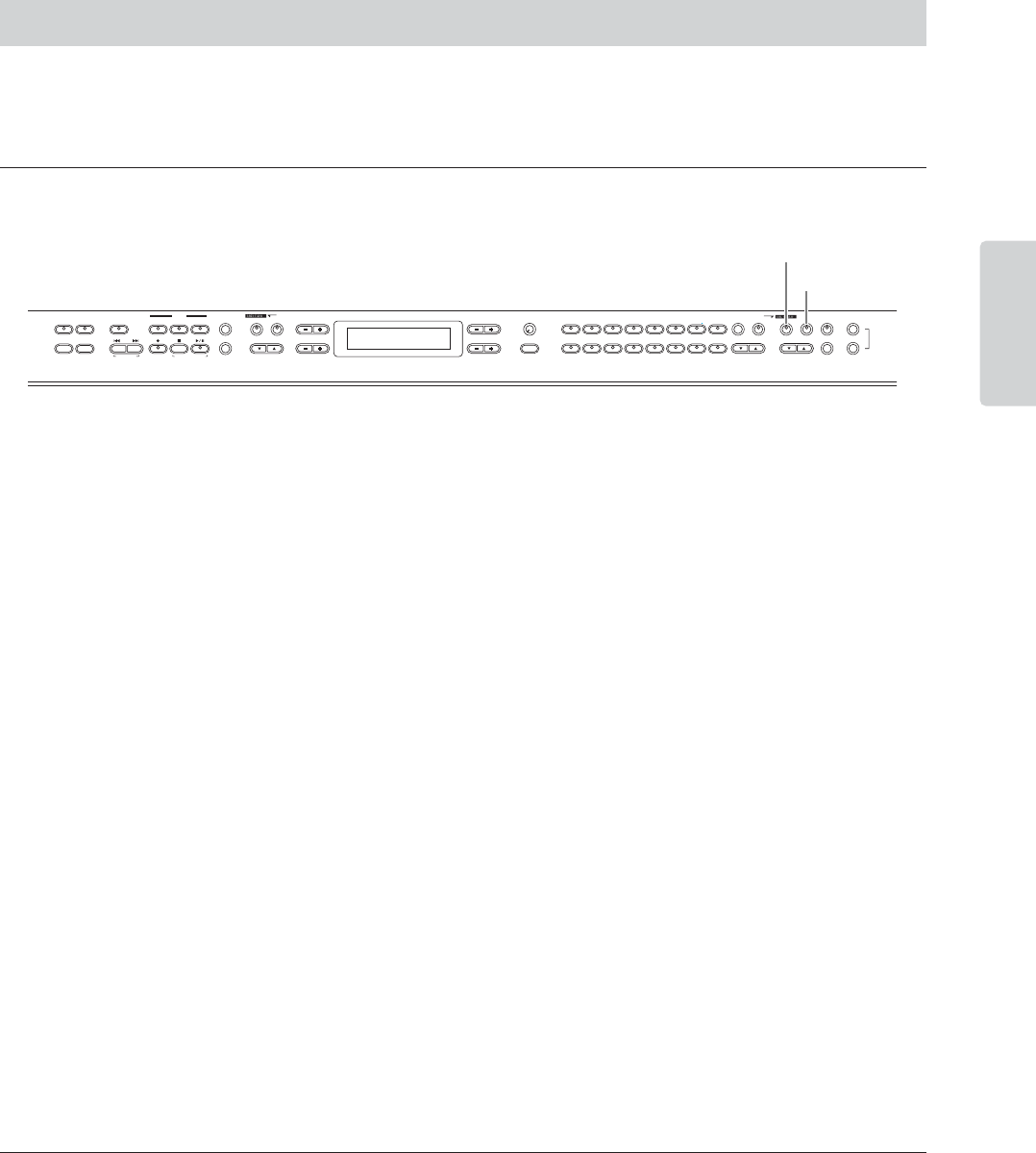
Quick Guide
CP300 Owner’s Manual
35
Basic Operation
The effect processing of the CP300 features both System Effects and Insertion Effects.
System Effects—Reverb and Chorus
System Effects are applied to the overall sound, whether it be a Voice, an entire Performance, a Song, etc. Each
part can be given a different amount of System Effect processing.
Reverb
The reverb effects add a warm ambience to the sound, simulating the complex reflections of actual
performance spaces, such as a concert hall or small club.
Refer to “Effect Type List” on page 114 for more information on the preset reverb types.
Pressing the [REVERB] button alternates between On and Off.
The indicator lights if reverb is turned on.
n You can select a reverb type via the “Reverb Type” parameter in the Voice Edit menu, and adjust the reverb depth
for the selected Voice via the “Reverb Send” parameter (page 58).
n Even if the reverb effect is turned off, a “soundboard reverb” effect will be applied for these Voices: GRAND
PIANO 1, GRAND PIANO 2 Voice groups and Mono Piano 1, Mono Piano 2, Marimba and Celesta Voices.
Chorus
The chorus effects use various types of modulation processing, including flanger and phaser, to enhance the
sound in a variety of ways.
Refer to “Effect Type List” on page 114 for more information on the preset chorus types.
Pressing the [CHORUS] button alternates between On and Off.
The indicator lights if chorus is turned on.
You can turn the chorus effect on and off by pressing the [CHORUS] button on the panel and by setting the
“Chorus On Off” parameter in the Voice Edit menu (page 59). The [CHORUS] button setting on the panel is
temporary. That is, if you select another Voice, the chorus setting for the previous Voice is cancelled.
The “Chorus On Off” parameter setting is saved for each Voice. That is, if you select a given Voice, the chorus
setting is automatically turned on or off according to the saved chorus setting.
n You can select a chorus type via the “Chorus Type” parameter in the Voice Edit menu and adjust the chorus depth
for the selected Voice via the “Chorus Send” parameter (page 59). You can also turn chorus on or off via the
“Chorus On Off” parameter (page 59).
Insertion Effects
Insertion effects can be applied individually to each part. Insertion effects are mainly used to directly process a
single part. The CP300 has three separate Insertion Effect blocks, letting you apply different effects on up to
three parts from Main, Layer, Left and Left Layer parts (page 27).
n You can select an Insertion type via the “Ins. Type” parameter in the Voice Edit menu, and adjust the Insertion
effect depth for the selected part via the “Dry/Wet Balance” parameter (pages 59, 60).
The CP300 also has a Variation effect that can be used as either a System effect or Insertion effect. Refer to
“Effect Type List” on page 114 for more information on the types of effects you can use. The Variation effect
can be controlled only by the use of MIDI messages.
Enhancing the Sound with Reverb and Chorus
NO YES
EXIT
MASTER
PERFORMANCE
MASTER EDIT
PERFORM.FILE
TRANSPOSE
SONG SELECT
NEW SONG
REC
STOP
PLAY/PAUSE
SYNCHRO START
SONG VOICE/PERFORMANCE
12
3-16
TRACK
SONG FILE
SONG SETTING
MIDI OUT PA NEL LOCK
DOWN UP
TEMPO
A
B
D
C
CONTRAST
GRAND
PIANO 1
GRAND
PIANO 2
MONO
PIANO
E. PIANO 1 E. PIANO 2 E. PIANO 3
CLAVI.
VIBES
ORGAN 1 ORGAN 2 HARPSI. STRINGS CHOIR/PAD
GUITAR
BASS
XG
12345678
910111213141516
VOICE EDIT
SPLIT
VARIATION
REVERB
CHORUS SPEAKER MIDI SETTING
MASTER EQ EDIT
CLICK
OTHER SETTING
DEMO
[REVERB] button
[CHORUS] button


















